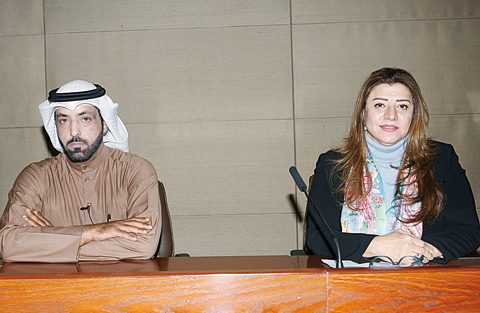 (From left) Naser Al-Hajri, the Supervisor of Follow Up Department at the Public Authority for Manpower and Fadwa Darwish, the ISC Acting Director and Director of Technical Support at UIC. —Photos by Joseph Shagra
(From left) Naser Al-Hajri, the Supervisor of Follow Up Department at the Public Authority for Manpower and Fadwa Darwish, the ISC Acting Director and Director of Technical Support at UIC. —Photos by Joseph ShagraKUWAIT: The Public of Authority for Manpower in Kuwait held a seminar for private company owners to increase awareness around the labor law. The seminar was held in collaboration with the Union of Investment Companies (UIC) and the Investment Studies Center. The Supervisor of Follow Up Department and Investigator and Legal Researcher at The Public of Authority for Manpower, Naser Al-Hajri presented some provisions of the law yesterday at Bahra Hall in the Chamber of Commerce and Industry.
In a quick overview of the history of Kuwait's labor law, it was observed that the first iteration of the law passed in 1959 was unfair to workers, and in the interest of the employer. The second amendment came in 1969 to address these shortcomings and regulate the relationships of both parties. Kuwait is currently operating under the umbrella of the law N. 6 of 2010, which includes 150 clauses.
It's worth noting that the labor law was passed before the issuance of establishment of the Public Authority for Manpower in 2013. This parallels Kuwait's international obligations in treaties signed with the International Labor Organization and the International Organization for Migration and Human Rights. It features a law granting more guarantees that modify the running conditions, employment of women, in addition to the rights of the private company owners.
Al-Hajri stated with respect to minimum wages: 60 KD was the minimum wage for workers set by the Kuwaiti law No 6 of 2010. But also, the law committed the Social Affair Minister in his capacity as responsible for the wage to be surveyed every five years, and will be for a draft resolution shall be placed by the National Assembly. In our purpose at the Authority, we review salaries and the labor market on a regular basis in an effort to further concessions.
There was a great interest from the audience to ask questions due to the vitality of the subject matter and their keenness of maintaining fairness of employment, particularly with regard to the allocation of the end of the service. The Supervisor said that the approximated number of financial benefits for labor issues has reached 27 thousand cases in courts across the country.
By Athoob Al-Shuaibi










